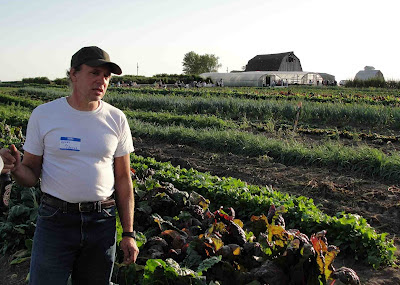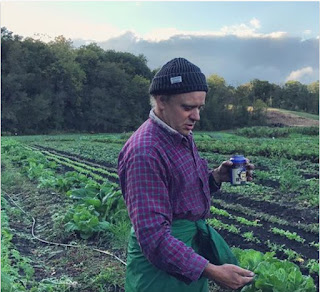End of Season Question, and Henry's Answer
Every year, Henry poses a question for his farmhands, interns, and market volunteers to answer at the end-of-season celebration.
Here's what Henry wrote when announcing this year's question. We offer it here for your reading pleasure, and as a prompt to get you thinking about who or what you are grateful for in your life.
 It has become a tradition at the after-party for everybody to answer a question that I pose beforehand. I like this tradition because it gives me a chance to hear from everybody and learn something about everybody, whereas when it was just an open party I would maybe have a deep conversation with one or two people, small talk with several others and might do no more than say hello and goodbye to many others.
It has become a tradition at the after-party for everybody to answer a question that I pose beforehand. I like this tradition because it gives me a chance to hear from everybody and learn something about everybody, whereas when it was just an open party I would maybe have a deep conversation with one or two people, small talk with several others and might do no more than say hello and goodbye to many others.So…to continue the tradition this year, here is the question: Who or what are you thankful for?
I know, it sounds trite...and predictable…but I have a specific type of answer in mind. First of all, there are two types of answers that are NOT allowed. First of all, you can’t say you are thankful for a close family member. “I am thankful for my mother…” No, that’s not allowed. Secondly, you cannot say, “I am thankful for Henry’s Farm.” That’s not interesting and if one person says that then everybody feels pressured to say something similar and it starts to feel like I am just fishing for compliments.
The kind of answer that I am looking for is to think of some time in your life when somebody said something, did something, reacted in a certain way, or a time when someone didn’t act in a certain way, didn’t say something, didn’t do something, and that changed your life in a way that looking back makes you feel grateful.
So I am looking for some specific event rather than a general thankfulness.
Here’s my example.
After the Nepal program was over, I spent some additional time in Nepal and then went straight from Nepal to Japan to earn enough money to continue my college career. I came back to the States in the spring of 1988. It had been six years since starting college but I was no nearer graduating then when I had started because when I wasn’t abroad I just took whatever classes sounded interesting. This meant that my credits were spread thinly over Biology, Chemistry, English Literature, Linguistics, Anthropology, Foreign Languages, World History, etc.
 By this point in my life, I had already met Hiroko and was thinking that she just might be the one I wanted to spend the rest of my life with. I had decided I really wanted to try to become a farmer if I could figure out a way to make a living at it. I really had no interest in attending college anymore. However, I thought it was important to get a diploma. I’d worked hard to pay for my own college education and I felt like it would have been a waste of all that money to just quit and I also thought that there was a good chance that having a diploma would come in handy someday. (It hasn’t. Well, yes, it did once, but that is another story.)
By this point in my life, I had already met Hiroko and was thinking that she just might be the one I wanted to spend the rest of my life with. I had decided I really wanted to try to become a farmer if I could figure out a way to make a living at it. I really had no interest in attending college anymore. However, I thought it was important to get a diploma. I’d worked hard to pay for my own college education and I felt like it would have been a waste of all that money to just quit and I also thought that there was a good chance that having a diploma would come in handy someday. (It hasn’t. Well, yes, it did once, but that is another story.)Having just finished Wisconsin’s study abroad program in Nepal, I figured the quickest route to a degree would be in their South Asian Studies program, so I re-enrolled at UW with the goal of just getting my piece of paper as fast as possible and then getting on with the rest of my life.
So, one of my first days on campus, I walked into the office of one Joe Elder, head of the South Asian Studies Department and also head of the Study Abroad programs to Nepal and India. I sat down and told him pretty much exactly what I just told you.
“All I want is to get a diploma as quickly as I can and move on to the rest of my life. What courses do I need to take to get my degree in this department and how long will it take me?”
Joe Elder reached over and pulled out the list of requirements.
“Let’s see,” he said, “it says here you need a minimum of 8 credit hours in South Asian religions. Henry, when you were in Nepal, you probably visited different temples and monasteries and such, didn’t you?
“Oh yes,” I said, “all the time.” And I told him about different experiences I'd had related to Hinduism, Buddhism, and Islam while in Nepal.
“Well,” he said, “I think we can check that off the list.” And he took his pen and marked the little box on the sheet. “Let’s see, then, we also require 8 credits in the Social Sciences. Did you study anything about the economy, social issues, anything like that?”
I proceeded to tell him about the semester independent study project I had done that focused on the problems of land degradation in the Himalayan foothills and its repercussions on everything from erosion and deforestation to poverty and malnutrition.
“Well, then, I think we’ve got that covered.”
And one by one, we went down the list of requirements, he asking me questions about my experience in Nepal, me answering, telling the truth, not making anything up or embellishing, just telling it like it was.
When we got to the end of the list, he leaned back in his chair and said, “Well, I think the only classes that you need to graduate are our Survey of South Asian Civilizations seminar that all majors are required to take. That is a two-semester course. Other than that, I think all you need is another 3 credits in language study and another course in the Humanities and you should be good to go.”
End of meeting.
So, I am thankful to Joe Elder, may he be rewarded in heaven. Thanks to his wisdom and his ability to look at me as an individual and really see me, thanks to his ability (very rare in any adult, particularly one in a position of power and authority) to understand where I was in my life and what I needed and what was most important to me at that point in my life, I was able to graduate with a degree in South Asian Studies from the University of Wisconsin after just one year on the UW campus. There was actually so little coursework required in my major that I was able to squeeze in all the coursework required to get a Certificate in Environmental Studies into that same year too.
Because of Joe Elder, let us praise his name, I was able to just get on with my life. If I would have walked into the office of pretty much any other department head in any other department at any other school in the country, I’m sure they would have told me, “Oh, you need to take this course and that course, blah, blah, blah. Oh, those credits won’t transfer…yadda yadda. I’m sorry but your independent study project doesn’t correspond with any of the course requirements of this department, pakka-pakka-pakka.” And I would have needed to spend two or more years pursuing a diploma that I would never actually have a need for.
But thanks to Joe Elder, let us sing of him, just 3 years after walking into his office, Hiroko and I had been married, had our first child, and I was apprenticing on an organic vegetable farm in New York. A year after that I was starting Henry’s Farm.
Who knows what would have happened, what I would have done, where I would be now if not for Joe Elder, to whom I am eternally grateful.
p.s. If you would like to know more about Joe Elder, who retired after 54 years at UW-Madison, check out these webpages: ..
http://www.quakersintheworld.org/quakers-in-action/201/Joseph-Elder
http://ls.wisc.edu/news/south-asian-scholar-humanitarian-elder-retires-after-53-years
